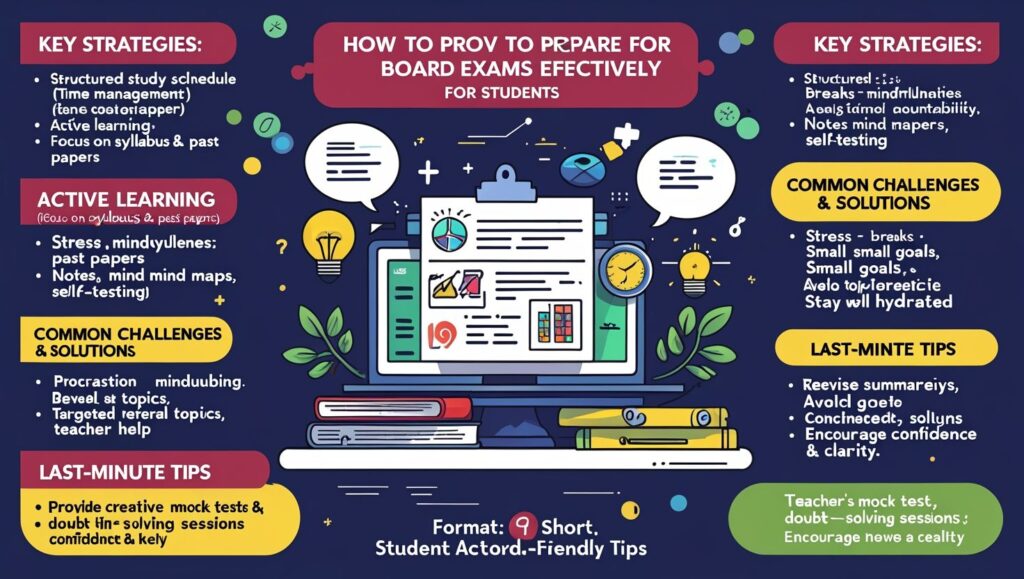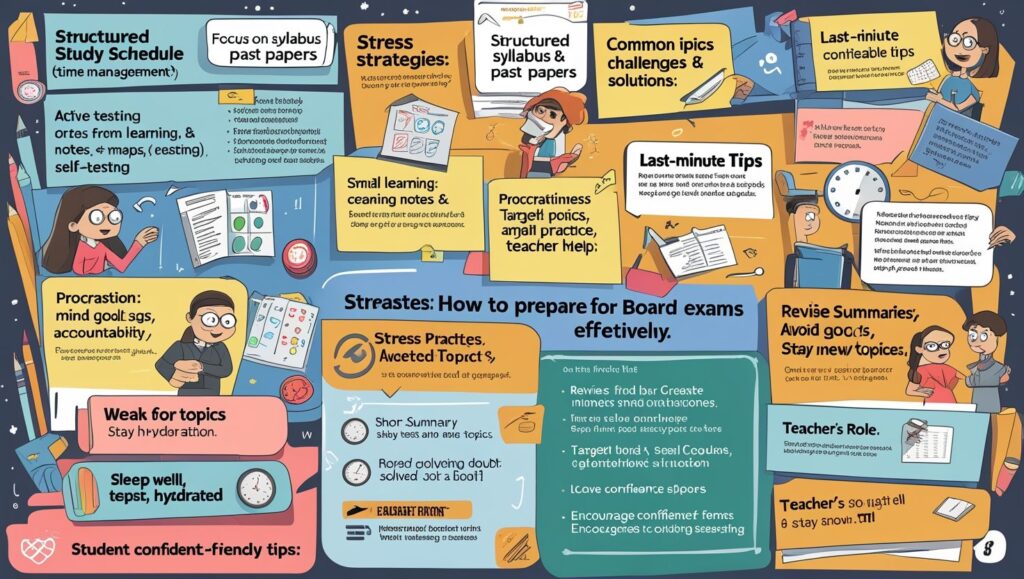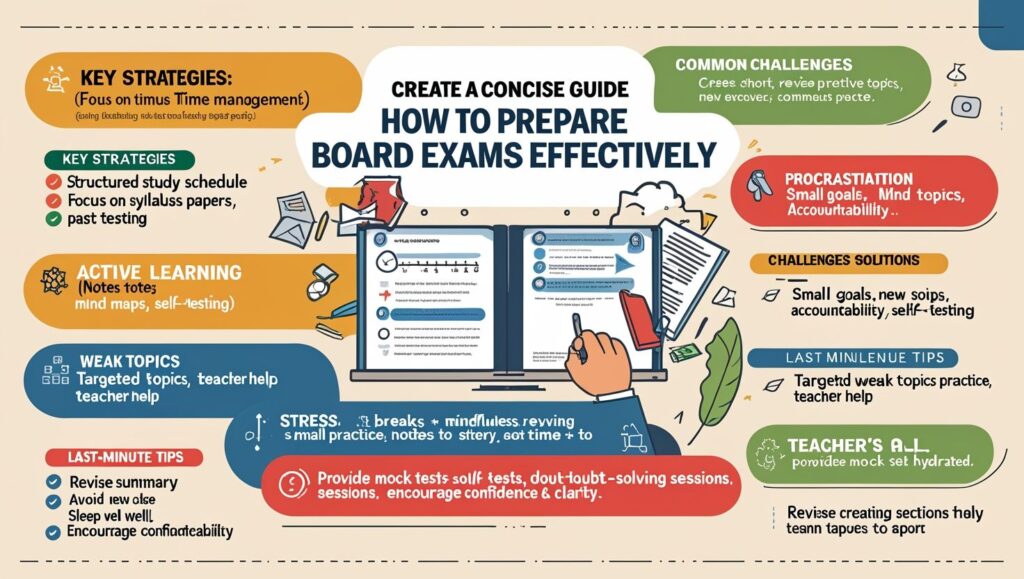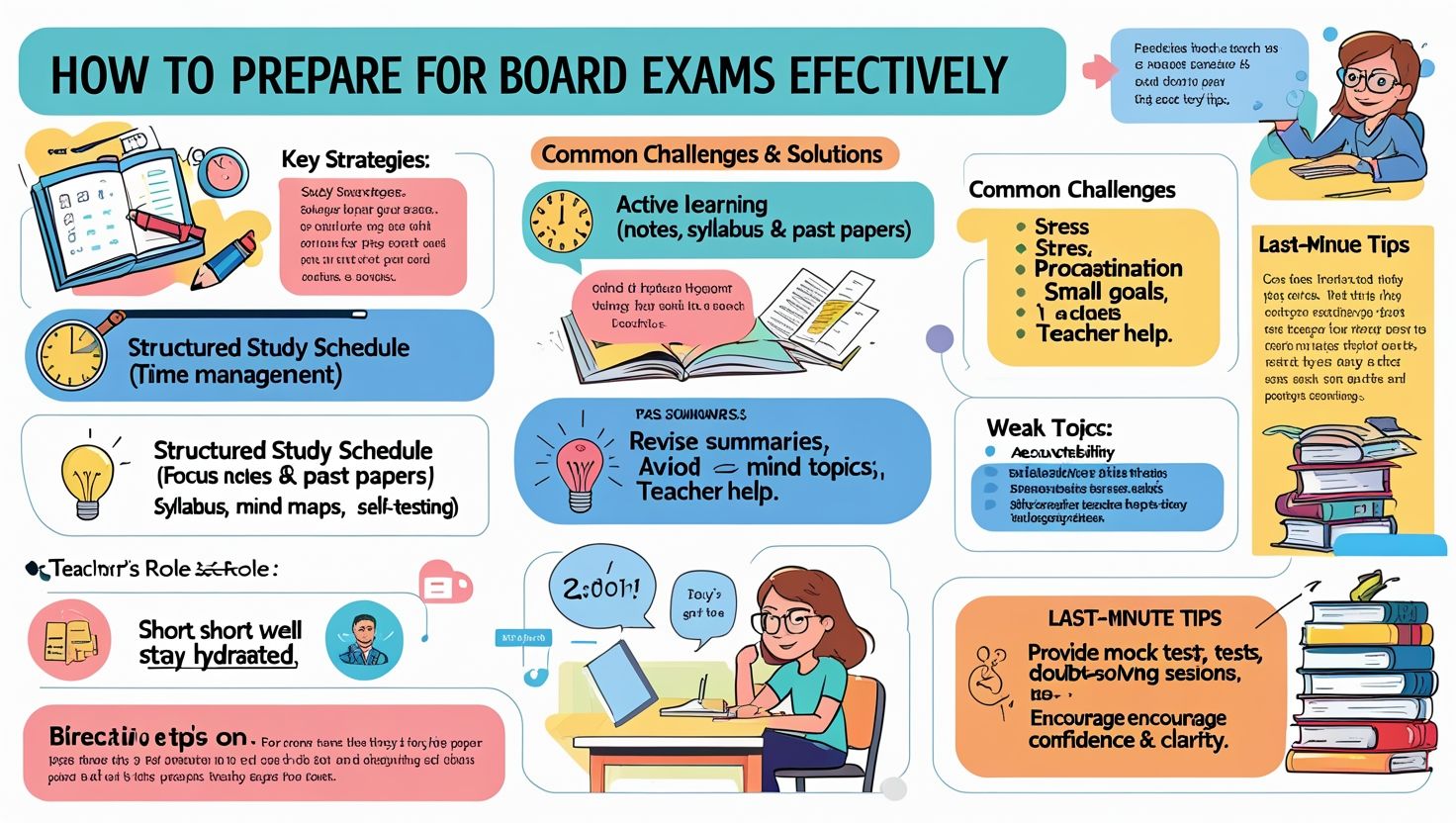Introduction
How to prepare Board Exams effectively in education, Board examinations are milestones that shape academic trajectories and, for many learners, future career choices. Yet the pressure surrounding them can cloud the actual goal: demonstrating deep, transferable understanding rather than rote recall. Effective preparation blends well‑planned study schedules, evidence‑based learning strategies, balanced well‑being routines, and mindful self‑assessment. The following guide distills that multifaceted process into seven practical pillars. Each section offers research‑backed advice paired with actionable tips so students can convert anxiety into structured momentum. Whether you teach a revision workshop, coach individual learners, or are a student yourself, these principles will help transform board‑exam prep from a last‑minute scramble into a deliberate, confident march toward success.
1. Crafting a Strategic Study Blueprint
Begin by auditing the syllabus: break every subject into units, then list each unit’s concepts, sub‑skills, and weightings. Color‑code topics by familiarity—green (confident), amber (needs review), red (difficult/new). Next, reverse‑engineer the timeline: count days until the first paper, subtract buffers for illness or unforeseen events, and allocate study blocks accordingly. Apply the “two‑cycle” principle: Cycle 1 covers every topic broadly, Cycle 2 reinforces weak areas and past papers. Within each day, interleave subjects (math → history → physics) instead of marathon sessions on one discipline; interleaving improves discrimination and long‑term retention. Schedule weekly “simulation slots” where students replicate exam conditions—same start time, permitted materials, no phone. Build in micro‑breaks (5 minutes every 45) and macro‑breaks (one half‑day off per week) to stave off burnout. Finally, keep the plan visible: a wall calendar or digital tracker with check‑off boxes triggers dopamine mini‑rewards that sustain motivation.
2. Mastering Content Through Active Learning
Passively rereading textbooks deceives learners with a false glow of familiarity. Replace it with active learning loops:
- Preview the heading or learning outcome.
- Explain the idea aloud as if teaching a friend (Feynman Technique).
- Check the source to fill gaps.
- Condense into dual‑coded notes—keywords plus quick sketches or diagrams.
For factual subjects (e.g., Biology), convert lists into flash‑cards with retrieval cues on one side and elaborative explanations on the other. Use spaced‑repetition apps (Anki, Quizlet) that algorithmically re‑surface cards just before forgetting occurs. For problem‑solving subjects, analyze worked examples, then deliberately practice by writing step‑by‑step solutions without peeking. When errors arise, create an “error log”: record the misconception, its correction, and a fresh example; revisit this log every few days. Interleave practice topics (e.g., algebra, geometry, statistics) to reinforce flexible thinking. Conclude sessions with a 3‑minute “brain dump” on blank paper—whatever surfaces unprompted reveals true retention.

3. Leveraging Past Papers and Marking Schemes
Past papers aren’t mere rehearsals; they are diagnostic goldmines. Start by reviewing the marking scheme before attempting questions—it clarifies command words (“analyze,” “justify”) and point allocation. Attempt whole papers under timed, silent conditions, then score with a different‑colored pen. For every lost mark, categorize the error: misunderstanding concept, misreading question, calculation slip, unfinished due to time. Notice patterns: if “explain‑two‑reasons” questions repeatedly drop points, practice concise, bullet‑pointed answers within word limits. Build a “question bank” sorted by topic and difficulty. After mastering individual items, escalate to mixed‑topic sets to mimic exam unpredictability. Finally, convert exemplar answers into mini‑rubrics; during peer‑study sessions, students can swap scripts and mark each other, reinforcing both exam literacy and metacognition.
4. Optimizing Memory with Retrieval and Spacing
Cramming may yield short‑term gains but fades quickly. Instead, integrate spaced retrieval practice. Create a calendar that schedules topic reviews at expanding intervals: Day 1, Day 3, Day 7, Day 14, and so on. Pair this with generation tasks—writing summaries from memory, sketching concept maps, or answering self‑made quiz questions—because the act of retrieval strengthens neural pathways. Employ interrogative elaboration: ask “why does this fact hold true?” and “how does it connect to what I studied last week?” to embed links across the curriculum. For definitions or formulas, try mnemonic chains or the method of loci, placing “memory hooks” along an imagined route (e.g., Formula 1 sits on the porch, Formula 2 on the staircase). Nightly two‑minute recaps—jotting three things learned and one lingering question—solidify the day’s gains and prime the brain for consolidation during sleep.
5. Managing Time and Stress on Exam Day
Preparation extends to the morning routine. Pack allowable tools (pens, calculator, ID) the night before and map travel time with a 15‑minute cushion. A light, balanced breakfast (protein + slow‑release carbs) stabilizes glucose for sustained focus. At the exam hall, deploy box breathing (inhale 4 s, hold 4 s, exhale 4 s, hold 4 s) to quell adrenaline spikes. Once papers arrive, skim the entire booklet, marking easy, medium, and hard questions. Allocate time proportionally to marks (e.g., 10‑mark question ≈ 12 minutes) and reserve a final 5‑10 minutes for checking.
Use the “traffic‑light method”: tackle green (easy) first to build momentum, amber next, red last. For essay questions, jot a quick outline to maintain coherence. If panic hits mid‑exam, pause, plant both feet, and silently name five objects in the room—this grounding resets cognitive bandwidth. After submission, avoid post‑mortem debates; instead, shift attention to recovery—hydration, a short walk, then gradual review for the next paper.

6. Sustaining Physical and Mental Well‑Being
Brains learn best in well‑kept bodies. Encourage sleep hygiene: 7‑9 hours nightly, consistent bedtimes, screens off 30 minutes prior. Short lunchtime walks double as light cardio and Vitamin D intake, boosting mood and cognitive flexibility. Teach quick desk stretches to loosen neck and shoulder muscles tense from long study spells. Hydration matters: even 1 % dehydration can impair concentration. Keep a water bottle within arm’s reach and set hourly “sip reminders.” Nutrition should favor omega‑3‑rich foods (nuts, fish), leafy greens, and slow carbs; limit caffeine after mid‑afternoon. Mental health supports include journaling, gratitude lists, or brief mindfulness apps; sharing concerns with peers or counselors prevents silent spirals. Treat leisure as non‑negotiable: a favorite hobby or 20‑minute sitcom episode recharges dopamine circuits, making subsequent study blocks more efficient than relentless grinding.
7. Harnessing Support Systems and Accountability
No learner is an island. Assemble a support ecosystem: subject teachers for conceptual doubts, peers for collaborative quizzes, family for logistical aid (quiet study space, healthy snacks). Form “accountability pods” of 3‑4 students who set weekly goals and check progress via short meetings or group chats. Use the Pomodoro co‑study method: everyone works silently for 25 minutes, then shares one insight or sticking point during the 5‑minute break—peer teaching cements understanding. Seek mentors or alumni who have excelled in past boards; their narrative tips often resonate more deeply than abstract advice. Leverage online forums cautiously; verify solutions against textbooks to avoid crowdsourced inaccuracies. Celebrate micro‑milestones—a completed unit, a personal‑best mock score—through small rewards (favorite snack, playlist break) to sustain morale. Remember, asking for help signals strategic self‑awareness, not weakness.
Conclusion
Preparing effectively for board examinations requires more than clocking study hours; it demands a holistic strategy that balances curriculum mastery with cognitive science, practical rehearsal, and self‑care. By crafting a precise study blueprint, engaging in active and spaced learning, drilling past papers, nurturing well‑being, and drawing on supportive networks, students transform high‑stakes anxiety into structured confidence. Educators, parents, and learners who embed these practices will not only see improved scores but will cultivate lifelong skills—time management, critical thinking, resilience—that outlast any single examination. Board exams thus become a proving ground not just of knowledge, but of disciplined, reflective learning habits poised to serve students well into higher education and beyond.
Quick‑Hit Tips for Effective Board‑Exam Prep
- Start With a Syllabus Audit
Break every subject into chapters and sub‑topics. Highlight which ones are high‑weightage or personally weak so you can prioritize. - Create a Realistic Study Calendar
Work backward from the exam date, slotting two full revision cycles and leaving buffer days for illness or emergencies. - Use Active, Not Passive, Study Methods
• Teach the concept aloud (Feynman Technique)
• Solve problems without looking at worked examples
• Write summaries from memory, then check for gaps - Embrace Spaced Retrieval
Revisit each topic at expanding intervals—Day 1, 3, 7, 14—to lock knowledge into long‑term memory. - Practice Past Papers Under Exam Conditions
Time yourself, stick to permitted materials only, and mark with the official scheme to spot recurring mistakes. - Maintain an Error Log
Record every lost mark, its cause, the correct approach, and a fresh example. Review this before each new practice test. - Interleave Subjects and Question Types
Rotate between, say, algebra, history essays, and biology diagrams in one session; it sharpens discrimination skills.

More Tips
- Master Command Words
Know the difference between “define,” “explain,” “justify,” and “evaluate” so your answers match marking‑scheme expectations. - Build Quick‑Reference Sheets
One‑page formula lists, timeline charts, or vocabulary grids posted on your wall give you constant, low‑effort reinforcement. - Schedule Weekly Mock Exams
Simulate the real timetable every Saturday to build stamina and refine time‑management strategies. - Look After Your Body
• 7–9 hours of sleep
• Balanced meals with slow‑release carbs and proteins
• Hourly water and stretch breaks to keep focus sharp - Deploy Simple Stress‑Busters
Box breathing (4‑4‑4‑4), a five‑minute walk, or a quick laugh with a friend resets your brain chemistry. - Leverage Support Networks
Form small accountability groups, ask teachers targeted questions, and share revision resources to lighten the load. - Avoid Last‑Minute Cramming
The night before, do a light skim, organize materials, and get proper sleep—consolidation beats bleary‑eyed memorization. - Keep Perspective
Exams are important, but they’re just one chapter of your journey. Maintain hobbies and relationships to stay balanced and motivated.

6 thoughts on “How to prepare Board Exams effectively in education”